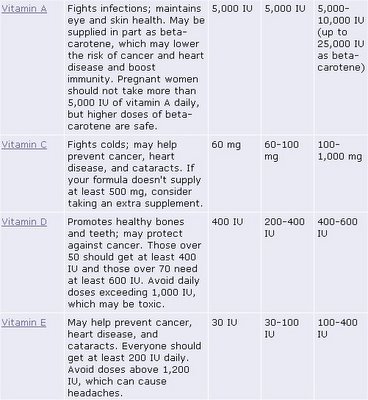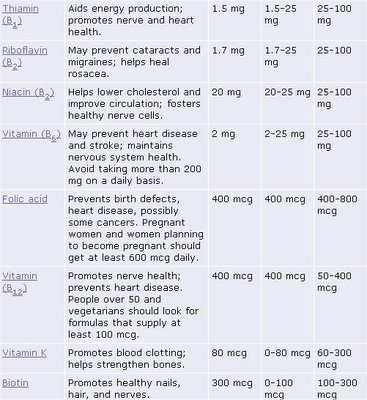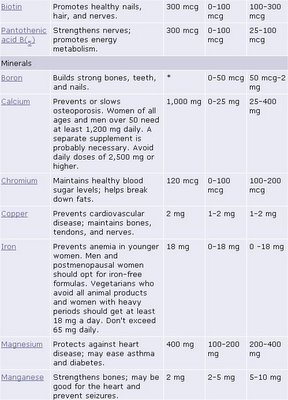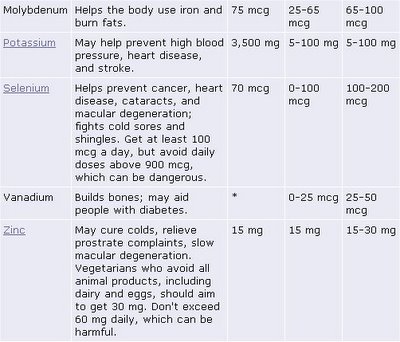
The Importance Of Multivitamin
Women, men, those over 50, those with chronic illness, and vegetarians have special needs to consider when choosing a multivitamin. Review your special needs below.
Why Everyone should Take a Multivitamin
There's nothing like a sound, low-fat diet full of fruits, vegetables, and whole grains to supply the vitamins and minerals we need to stay healthy. Unfortunately, we don't always eat well. Add to that the possible harmful effects of stress, aging, lack of exercise, pollution, and illness, and supplements become even more important. That's why so many experts now recommend that everyone take a daily multivitamin.
The Right Choice: See Our Multivitamin Chart
This chart outlines the key vitamins and minerals your multivitamin should supply and the main benefits of each nutrient. It also gives what's called the daily value (DV) - a new government standard that generally corresponds to the RDA. The DV satisfies minimum daily requirements and helps prevent a deficiency disease, such as scurvy (lack of vitamin C). The higher levels of vitamins and minerals found in many multivitamins may actually help prevent disease, delay its onset, or lessen the severity of certain ailments.
Good Reason to Take an extra-strength Formula
If you eat an optimal diet of low-fat foods, at least five servings of fruits and vegetables daily, and chicken, lean meat, or fish several times a week, you can probably get away with a once-daily formula. But even those who consume a fairly well-rounded diet and yield to junk-food lapses only occasionally can benefit from an extra-strength formula. If your idea of lunch is a slice of pizza and a diet soda, look for a multivitamin in the upper ranges of our chart.
Finding the Right Multivitamin for You




Special Needs
Women of all ages need at least 1,200 mg of calcium daily, through supplements or diet, to slow bone loss. Most multivitamins don't supply this much: A separate calcium supplement is probably your best bet. Younger women, especially those with heavy menstrual periods , need plenty of iron (18 mg a day ). Those considering pregnancy should get extra folic acid and avoid high-dose vitamin A. Special "women's formulas" may contain expensive herbs you may not need.
Men should avoid multivitamins containing iron: Iron build-up has been linked to heart disease. Be wary of "men's formulas that tout ingredients like saw palmetto for prostate complaints : Many of these high-profile "extras" are present in such small amounts that they provide little or no therapeutic benefit.
Over 50,opt for iron-free formulas: Too much of the mineral can cause heart problems. Look for vitamins B6 and B12 in the higher ranges, because as people age, they often have trouble absorbing these nutrients. Older women and men can benefit from the bone-strengthening effects of extra calcium (1,200 mg a day) and vitamin D (400 to 600 IU a day).
Chronic Illness can lead to poor eating habits or deplete nutrient stores. Extra-strength formulas are especially important if you suffer from a long-term digestive ailment or have liver or gallbladder problems. Consult your doctor before taking supplements.
Vegetarians who avoid all animal foods, including dairy and egg products, need at least 100 mcg daily of vitamin B12. Zinc, iron, and calcium are also very important minerals for strict vegetarians.
By wholehealthmd.com
http://www.wholehealthmd.com/
